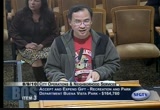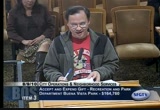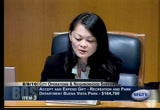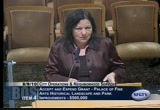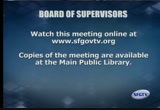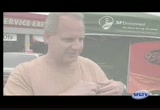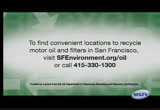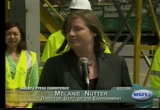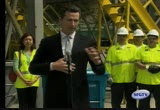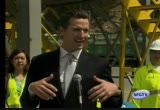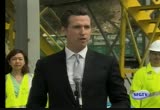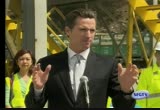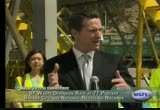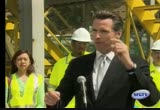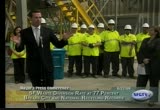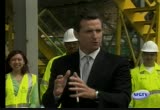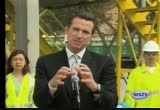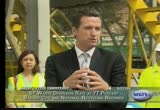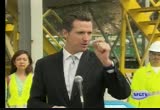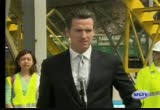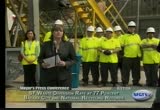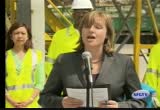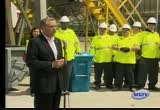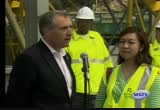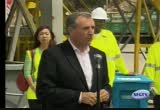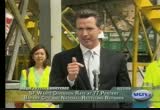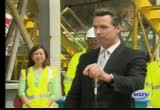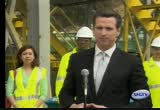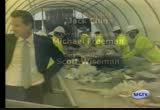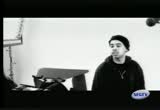tv [untitled] September 12, 2010 5:30am-6:00am PST
6:30 am
ran -- park and rec and other agencies. i think a lot of those trees are still standing, just waiting for gravity to fall. i would like to suggest that john mclaren park be checked out. there has already been one death with subsequent city liability payment, and also, i think that sunset boulevard and the presidio drive should also be checked, even though i have noticed that some of the trees have been trimmed in the two areas, but still, when i drive on those and other areas in the city, i feel that the maintenance has been kind of substandard. i do notice that in some of those areas, there have been very nice new trees planted, but three, four, five, six months later, there has been an obvious growth of weeds,
6:31 am
especially on portola drive, which is interesting because it is it in a fairly affluent neighborhood. anyway, i think it is noteworthy that san francisco conservation corps do this kind of work because it is not only giving them a chance to show what they can do but also would help park and rec eliminate trees before the city as more possible payouts for maps of injury, since according to what i have seen in those areas, those trees are fairly big, and it would not take very much of a tree to fall in order to hurt someone. supervisor chu: thank you. are there any other members of the public who wish to speak on this item? seeing none, public comment is closed. i do appreciate the member of the public who did speak on the issue of public safety and about safety in many of our facilities. with past issues, the city was
6:32 am
able to secure several million dollars in order to work on some of the repair work on pulling down and save trees across our recreation park facility. we recommend -- we recognize that is something that needs, sterne growth, and we work with the parts department to remove the most highly rated trees from those sites, so thank you very much for that comment. seeing that we have close public comment, do we have a motion? supervisor avalos: motion to approve. supervisor chu: is that a motion to approve this item and send it forward with a committee report? without objection. >> item three will be before the full board august 10, 2010. item four, resolution authorizing the san francisco recreation and park department to accept and expend a grant administered by the california state library california cultural and historical and, in the amount of $500,000 for palace of fine arts historical
6:33 am
landscape and park improvement. >> this item again is a grand valued at $500,000 -- grant value of $500,000. it will go to improve the historical landscape and park improvement. the project is also in construction and is expected to be substantially complete in october. the recreation and park is requesting your recommendation for approval of the resolution. supervisor chu: thank you very much. are there any questions? why don't we open it up for public comment. are there any members of the public who wish to speak on item four? seeing none, public comment is closed. >> move this item with recommendation as a committee report. supervisor chu: we have a motion to move this item forward as a committee report.
6:34 am
6:35 am
we can go into a refinery and we can use it again. they do oil changes and sell it anyway, so now they know when a ticket to a. hal>> to you have something you want to get rid of? >> why throw it away when you can reuse it? >> it can be filtered out and used for other products. >> [speaking spanish] >> it is going to be a good thing for us to take used motor oil from customers.
6:36 am
we have a 75-gallon tank that we used and we have someone take it from here to recycle. >> so far, we have 35 people. we have collected 78 gallons, if not more. these are other locations that you can go. it is absolutely free. you just need to have the location open. you are set to go. >> good afternoon. i'm the director san francisco's
6:37 am
department of the environment. we are here today with our partners to make an announcement about san francisco's accomplishments in the cycling that can only be called the story. san francisco is a city that knows how to recycle. over the years, our city has been a nationwide later in recycling, and mayor newsom has made it a priority to develop new recycling and composting programs, set aggressive goals, and keep us on track. without further delay, it is my pleasure to introduce mayor gavin newsom, who has some spectacular news. mayor newsom: i think this is the completion of your first week on the job. melanie was with the speaker's office doing similar work, so that we could be successful in san francisco and but in a position to make a lot of the announcements we have been making bore over the last number of years. i happen to think this is a big deal. i think that other cities across the country that struggle to
6:38 am
deal with the issue of their diversion rates with landfills that are literally filling up, that are becoming floating regattas of landfills that are being pushed up and down rivers and across the coast and around the continent, that this represents an important milestone, the cities can think differently and act differently and do some of them substantially differently -- do something substantially differently as it relates to their waist. what we know, we do not think, is that 1 million to 1.5 million people are moving into the urban cores and consuming roughly 80% of the earth's natural resources in these urban centers. what do you do with that consumption? what do you do with that waste? what do you do with the construction debris associated with accommodating for that mass urbanization as it relates to the majority of the planet now
6:39 am
living in these urban course? in san francisco, we have answered these questions to the degree that no other american city has answered. we have answered these questions in a way that not only protect our environmental framework and footprint but at it -- advances and economic framework and paradigm that creates wealth, opportunities, jobs, as we reduce our aversion rates and greenhouse gas emissions concurrently. this is a big announcement. was not that long ago that i got into local government, that we. 35% of our waste was being diverted from the landfill. it was pretty good at the time, and i'm not 90 years old. it was not that long ago. and we set these audacious targets, people saying, "there they go once again.
6:40 am
this cannot be done nearly this will destroynqñ!ó the economic c of the city. this is burdensome, the government coming in and determining how someone should ask, how someone should " weç hit that goal. people said it was amazing. other cities said that it was amazing and asked how we did it. they came out here, and we started to see the first groups of folks coming on tour, not to see coit tower, not to see the golden gate bridge, not to jump on a cable car or go down to the birthplace of the biotech industry or ucsf. they started coming down to the recycling facility. foreign leaders coming onshore to the recycling facility asking how we did it. we have experts from government, from business. we saw folks in academia saying that san francisco is doing something right, so we reach that milestone of 15%, and we said that is not a stretch bowl.
6:41 am
that was a good and impressive first start, but let's raise the bar. what we did a number of years ago, i think it was seven years ago, we set forth our new, more audacious goals, and that goal was to reach 75% of version by 2010. -- 75 percent diversion. and eventually get to zero waste by 2020. people said that was cute, that was fun, but these guys have lost it because they do not understand. i remember listening to these experts saying that we just did not understand how it works. the first 50% or 60% is the easy part. once you get past 60% or 65%, then every% increase comes at a huge cost. it is too difficult, but we thought we could put it together, and one of the ideas was to create a construction and
6:42 am
debris ordinance, which we passed in 2006. this was landmark legislation. where we said if you were going to develop or get in the construction business or remodel or reconstruct and demolish, the you have got to get -- what? roughly 60%? 65% of that debris diverted. that helped. the construction industry was not necessarily opposed. they saw some benefit. they have got to dispose of this one way or another. requires some on-site disposals and strategies that at the time took a little different kind of thinking, but eventually, people got it right. we extended the small folks you see behind me in the pickup truck, so they do not have to worry about their back yard and their little kitchen, but for the bigger projects, we did this, and suddenly, our numbers started to creep up over 70%.
6:43 am
no city in america has ever come close to that. there are cities just down the road that have not even reach 50%. big cities can never even imagined 50% or 55%, and here we are. i remember being mayor out here a number of years back, and we were proud of 7%. they said it would be very difficult to reach that 75%. that income is tough. until last year when we came out and we were out here and we have the hard hats on, and we came out and said because not only that construction and building debris ordinance, but because of this new idea on composting, which we realize was a big component of the remaining waste that is here that was not being diverted that if we could raise the bar be on the first ordinance with this next order is, that we could reach that goal, and we announced that we
6:44 am
were close. we were at 72%. this again was historic and people were mesmerized, and no one more than us, that we could reach that goal because the incredible work that you see from the folks behind me and the imagination of recology. and then composting happen. first city in america to require composting. "san francisco's off the deep been. they have lost." we do not know why it did not happen before. the ban on plastic bags, and no one could shop again. we have shut the economy down. water bottles. now with composting, you have gone too far. "you mean, sir, that you will require me to take eggshells, and i have to put them where? the green, the blue, no, no, the green -- that is too much." san franciscans could never
6:45 am
figure this out, and some actually went to my private garbage. reporters had a photograph taken of my garbage. it opened the lid. came down and visit me at home. there was a top of a water bottle in a green been, not the blue one. this is outrageous. the garbage police are next because they are going to find you. this is a way of generating money. of course, what we were ultimately generating was hysteria. now, we are here to celebrate what we have really generated is jobs. the folks you see behind me are green collar examples. these are the folks that because of these proposals, because of these new ideas have work and
6:46 am
have the dignity that comes with a paycheck. 118 jobs have been created in the last couple of years since we instituted some of these new proposals. recology has over 1000 folks disproportionately in the recycling business now. that is why they changed their name, so there was this notion of recovery, as opposed to the old scavenger framework. it was all about hauling and just dumping. now, it is about hauling and diverting, and the jobs that are part of this are the jobs of the new economy, and that is what we are celebrating. 77% of our waste is being diverted, highest in the united states of america, shattering our hopes and expectations of reaching that 75% milestone and giving us so much mentum -- momentum and enthusiasm that that goal, talk about a truly 20% city, is proving this can be
6:47 am
down, right in front of us. let me end as i began -- enthusiastically. i do not think this is a big deal. i know this is a big deal. the more i tell, not just the state, but the country, and i see folks all around the world, and they are dumbfounded by what the city has accomplished. you know how cities really operate? what you do not want to understand is what goes on and goes down here. this is about waste water. this is the stuff that lies beneath the surface, and at the end of the day, it is the stuff that really matters because at the end of the day is the work that these guys are doing behind me in this building. jobs, the new economy, these mandates that brought people together, not divided people.
6:48 am
no, garbage police are not out there. the business community did not disappear. quite the contrary. what we have done is raise the bar for others. we have given people the sense that this could be done. more to the point, why should you care about this outside of san francisco? you should care deeply about this because again, it is those in urban centers that are consuming the vast majority of resources and then disposing them in your back yards in a landfill near you. unless we come up with creative ideas, we are going to be dumping all of our waste. these cities will be dumping their waist down the road from your playground, down the road from your park, so this is something that all californians, all americans should be gravitating towards and enthusiastic about. the new paradigm of being able to deal with a very tangible thing that needs to be dealt with in an urban america in a
6:49 am
way that creates jobs, creates wealth, and promotes the ultimate frame of environmental sensibility and environmental responsibility, reducing methane gas emissions, reducing greenhouse gas emissions, and reducing the need to purchase and develop larger, more burdensome, more toxic landfills throughout the region, state, and the country, including on those will barges you see in other cities that just do not get this. i am proud of this. i want to thank the rest of the folks at recology the good work that was done by our commission, and the partnerships that we formed. this is a true public-private partnership, and i'm thankful for all the hard working men and women at recology.
6:50 am
thank you. [applause] >> hang you, mayor newsom, and thank you for helping us achieve our 77% landfill that version rate -- thank you, mayor newsom. we need to focus our attention on achieving 0 waste by 2020. to meet our goal, we will need the continued participation of all san franciscans in the mandatory composting and recycling program, making sure that everything possible goes into the blue and green bins, and as little as possible goes into the black. as the mayor pointed out, we sent the smallest amount of material to landfills since we have been keeping records. less than 15% the year before. we are right on track, and if we keep up achieve 0 well in san francisco well before 2020. .9 waste
6:51 am
in san francisco well before 2020. we already accomplished this lovely to a degree with bans on hard to recycle products like plastic bagszek]ñisr and a the. there are actions globally, but change does need to happen at the state and federal level, and that is why san francisco has been supporting extended producer responsibility legislation in sacramento and washington. taxpayers and local governments shell out millions of dollars every year to handle problem products. it is time that we require that manufacturers take responsibilityrw for their own actions and their products. when we hold corporations responsible for making sure the products they sell get recycled properly and one public health and environmental costs are factored into that product price, manufacturers have a strong incentive to design goods that last longer, are easily recyclable, and ultimately are less toxic.
6:52 am
we need to give a lot of credit to our partners at recology for the city's recycling success. we do not have a garbage company. we have a recycling company. so it is my distinct pleasure to introduce recology's ceo and san francisco's no. 1 ally in zero ways. mike. [applause] -- zero ways. mike. >> thank you, and thank you, mayor newsom, for using our site for this announcement. we are pleased to be the city's partner in helping achieve the goals that the city sets forth. some of them have been rather exciting to try to accomplish, but it has been found, and we are going to ensure that this city isw6r;[ñhr the first to ace zero ways, and we are going to do it before 2020. there are a lot of exciting
6:53 am
things going on, and we believe it is doable, and we are committed to making sure it happens. in the process, it has been pleasing for us to be able to put people to work doing a very necessary function. i want to introduce mimi chan, who came to us through the jobs now program and has been able to get to work doing something that we did not have the money to do before the programf5b gave us te work -- the money to do the work. >> i love this company. when i first started, i was really excited because i was working for a green company. when i leave, just about work. i bring my work home. i teach my kids about recycling, composting, and when i go to another city, another state, it angers me to see people throw
6:54 am
everything in the garbage. i tell them that they cannot do that.u we have think i'm crazy,' but when my - year-old steps in and says if you have to recycle and compost, they know that i am serious. i love my job. kvfutu3ñiññi have kids. i have kids, and it is just securing its future for my kids, my grandkids, and everybody down the line, and i thank you for the opportunity. >>ñ%iñkó we have 3000 to 5000 s come through here every year,y home and teach their parents how to do it right. as all these families are visiting other communities, it is amazing how many other places want to achieve what we're doing here, and wegqvúr?r think we arn a position to help them accomplish that. mayor newsom: interesting anecdote. you will probably appreciate -- no, you probably will not, but i will throw it out anyway. [laughter] we've diverted about 8 million tons of waste, which is roughly
6:55 am
twice the tonnage of the golden gate bridge. we only put about -- what? 600,000 tons into the landfill, which again, to put it in perspective -- just 200,000 tons last just in the second, so see how quickly we are moving to reach our goals? it is an extraordinary thing. what is equally extraordinary is the need to continue to promote these programs. we still have roughly 2/3 of what is here that still goes to landfills. that can be recycled, so we still have all this low hanging fruit -- literally, fruit -- that can be easily composted that is still being put to a landfill because we are not separating all of it. we have seen a 45% increase in
6:56 am
composting. without being punitive, without being aggressive, just educating folks. being thoughtful, encouraging people, but again, we are still within the margin of where we could be if everyone again steps up to the plate. final point -- it is the kid that you go to the public schools, and you see these little kids. j6óçw3we fund salad bars in the schools, and you see kids with broccoli, and they may not have finished it, but at least they were not eating pizza and burritos, and then they run over and put it in a)e composting thing, and they find out that compost goes and creates something called soil, and that garrett -- they take some of that dirt that does not now valley and all those fancy wine areas that look at this as liquid gold or -- what is it? what do you guys call it? black gold. i like that. you give a little back to the schools, and the schools take
6:57 am
that and put it in their little garden outside, and then they actually learn about 7 there are no shortcuts in life, and the important lesson is that a lot of us have forgotten. these are important life lessons. all part of the edible schoolyard initiative and the educational component that ;>me2ci in a meaningful way, and kids, again, are leading the charge. that was my added anecdote. exactly. whatever. all right, come on back. >> thank you, everyone, for coming. we did want to thank mayor newsom for your leadership and all the great staff at san francisco department of the environment. robert daly, kevin drew, the of the facility.
80 Views
IN COLLECTIONS
SFGTV: San Francisco Government Television Television Archive
Television Archive  Television Archive News Search Service
Television Archive News Search Service 
Uploaded by TV Archive on

 Live Music Archive
Live Music Archive Librivox Free Audio
Librivox Free Audio Metropolitan Museum
Metropolitan Museum Cleveland Museum of Art
Cleveland Museum of Art Internet Arcade
Internet Arcade Console Living Room
Console Living Room Books to Borrow
Books to Borrow Open Library
Open Library TV News
TV News Understanding 9/11
Understanding 9/11